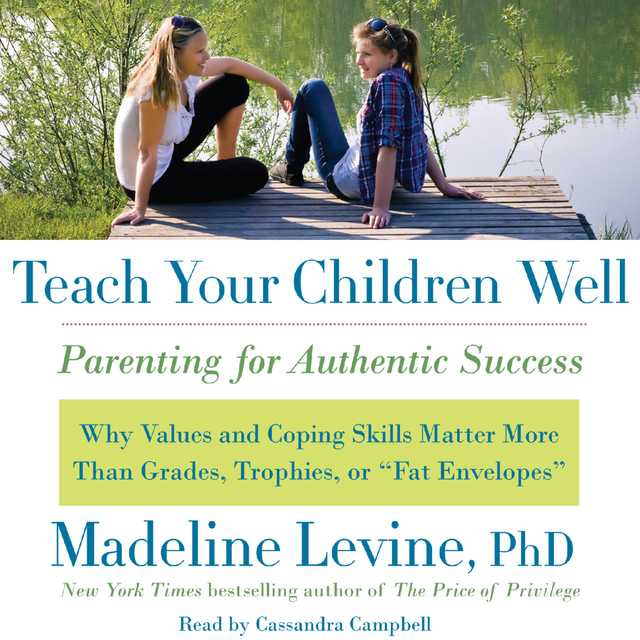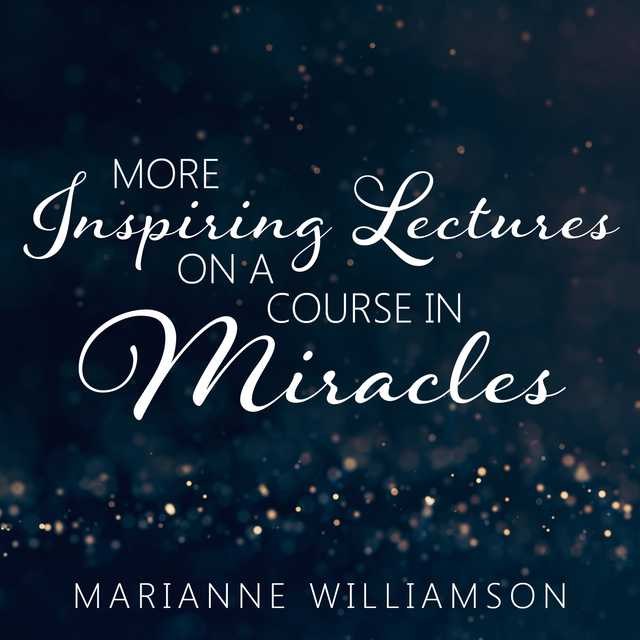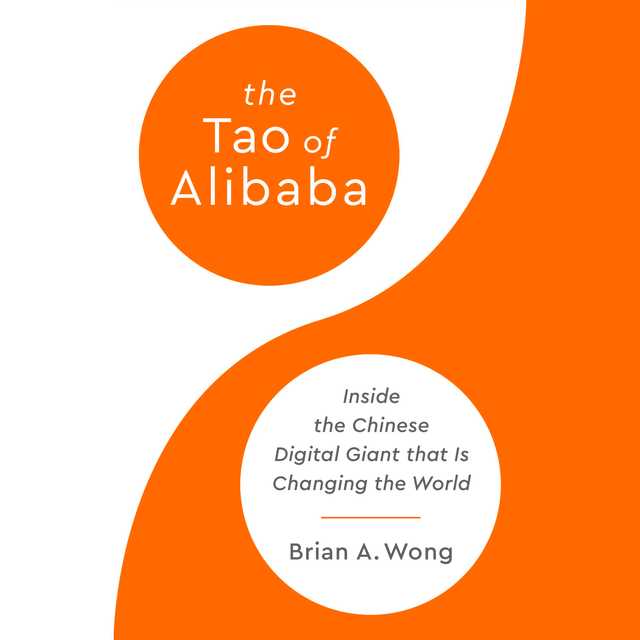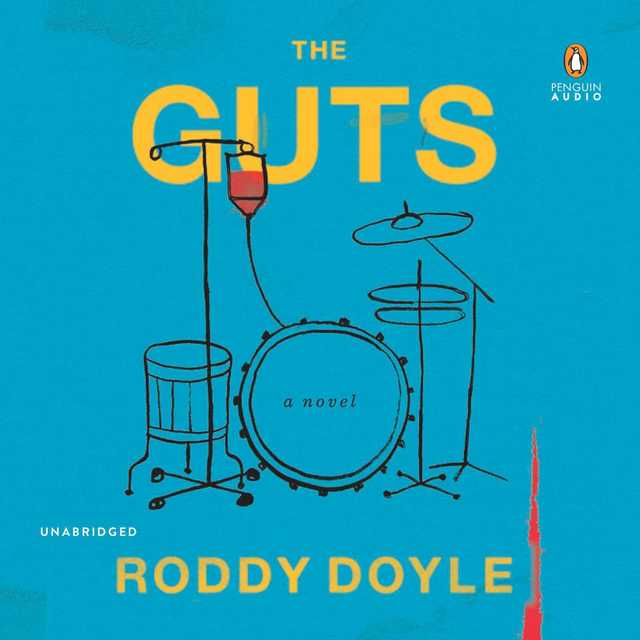Teach Your Children Well Audiobook Summary
Psychologist Madeline Levine, author of the New York Times bestseller The Price of Privilege, brings together cutting-edge research and thirty years of clinical experience to explode once and for all the myth that good grades, high test scores, and college acceptances should define the parenting endgame.
Teach Your Children Well is a toolbox for parents, providing information, relevant research and a series of exercises to help parents clarify a definition of success that is in line with their own values as well as their children’s interests and abilities. Teach Your Children Well is a must-read for parents, educators, and therapists looking for tangible tools to help kids thrive in today’s high-stakes, competitive culture.
Other Top Audiobooks
Teach Your Children Well Audiobook Narrator
Cassandra Campbell is the narrator of Teach Your Children Well audiobook that was written by Madeline Levine
Madeline Levine, PhD, is a psychologist, consultant, and educator; the author of the New York Times bestsellers Teach Your Children Well and The Price of Privilege; and a cofounder of Challenge Success, a project of the Stanford School of Education that addresses education reform, student well-being, and parent education. She is also a consultant to BDT & Company, a merchant bank that advises and invests in founder- and family-led companies. She lives in San Francisco with her husband and is the proud mother of three adult sons and a newly minted granddaughter.
About the Author(s) of Teach Your Children Well
Madeline Levine is the author of Teach Your Children Well
More From the Same
- Author : Madeline Levine
- Ready or Not
- Publisher : HarperAudio
- Abraham
- American Gods [TV Tie-In]
- Dead Ringer
- House of Sand and Fog
- Prey
Teach Your Children Well Full Details
| Narrator | Cassandra Campbell |
| Length | 10 hours 57 minutes |
| Author | Madeline Levine |
| Category | |
| Publisher | HarperAudio |
| Release date | July 24, 2012 |
| ISBN | 9780062222879 |
Subjects
The publisher of the Teach Your Children Well is HarperAudio. includes the following subjects: The BISAC Subject Code is Child, Developmental, Psychology
Additional info
The publisher of the Teach Your Children Well is HarperAudio. The imprint is HarperAudio. It is supplied by HarperAudio. The ISBN-13 is 9780062222879.
Global Availability
This book is only available in the United States.
Goodreads Reviews
Kirsti
September 08, 2012
I don't know much about children or psychology; I just really enjoy this author's writing style. Very clear, practical, simply stated. She is furious that the American educational system is putting so much emphasis on test scores, class rankings, Advanced Placement classes, school rankings, and elite universities. Instead of the system being a race to the top, she says it's a bad fit for kids who aren't that intellectual and puts way too much pressure on the intellectual kids. She urges parents to sign their kids up for fewer activities and avoid "specializing" in one sport or instrument. Oh, and fire the tutors in most cases--they sometimes turn children into hothouse flowers who can thrive only with one-on-one attention.
Audrey
October 23, 2013
Sometimes, by serendipity, you end up reading the right book at just the right time. This was the right book for me, right now. I heard Madeline Levine interviewed last year when this book first came out. Based on the interview, I thought it sounded like an interesting but somewhat impersonal overview of what's wrong with our current educational system. And indeed, the book does talk about the disconnect between what and how our schools teach and the kind of people we envision our children becoming. But it's the subtitle, "Parenting for Authentic Success," that really captures the book's essence.I wasn't prepared for how deeply the book would resonate with someone struggling to be a good parent to teenagers. "Teach Your Children Well" is not a self-help book, but reading it certainly gave me new tools to help myself and my children. It contains anecdotes from Levine's 30 years as a therapist working with children and families in the San Francisco Bay area (always comforting to know that you're not alone in your struggles). Most helpful to me were several chapters that illuminated what is going on inside teenagers from a psychological and physiological perspective, as well as a very practical section on defining--and putting into practice--what you value as a family.I'd always thought that the visceral, vivid, and sometimes painful memories of my own adolescence would make me a more empathetic parent when that time came for my own children. It turns out that experiencing someone else's adolescence, especially that of your own child, is radically different than having lived through your own. I'm glad there are guidebooks like this to help parents navigate thoughtfully. Bottom line: If you have a child in the house, of pretty much any age, read this book!
Histteach24
July 15, 2014
I thoroughly enjoy her books as both a parent and an educator. I have been saying much of what she did for the last decade of teaching.Too many kids are going to college who should not be college bound. Instead they need to be encouraged to go into other fields-trades, etc. instead the stigma has been placed that everyone needs to go to college, it has become a competition among parents. My own son just recently graduated from high school. The first question I get is where is he going to college. No one asks if he is going, they just assume. When I tell them he isn't, that I told him he needs to work and figure out what he wants to do instead of wasting money, people get uncomfortable as if they don't know where to proceed with the conversation. As a teacher I've been seeing more and more issues with grade grubbing and cheating because of the pressures put on students as well as parents insisting their children are all gifted when clearly they are not. I feel like I need to hang a big sign in my room saying "You are not special" just to get kids back down to ground level so they can feel comfortable finding their strengths and working on their weaknesses without the pressures of having to be above average in everything. The only criticism I have with the book was I felt the author is all too ready to blame the education system. Even as an educator, I agree the system needs to be changed to have students explore career paths and various fields. Trust me all educators I know feel this way. But the bottom line is no one listens to the teachers, instead the taxpayers push for what they feel makes them and their child appear more gifted. Trades, arts, etc are no longer valued by communities and are getting pushed out of school budgets. When parents are in a competition and their children are the game pieces, the children suffer. Also, testing and new evaluation systems are zapping creativity from the hands of innovative teachers. I agree that more creativity and learning through exploration needs to be an every day way of learning, but you have to empower and professionally trust educators to do what they do best-teach. Pitting them against each other because of the new evaluations only creates undesirable competition in a field that thrives under collaboration. Rating teachers on standardized test performance forces the classroom to become teaching to a test while learning absolutely nothing children really need to be successful.
Corina
June 09, 2019
It’s a very useful reading for any parent, particularly for parents with children aged toddler and upwards and definitely indispensable for parents of preteens and teens. It challenges our contemporary competition-driven worldview and guides us in going back to the basics of success: being in tune with yourself, focused on well-being, empathic, resilient and with a healthy dose of self-efficacy. Could be easily transformed into a cheat sheet, as it’s very well-structured. I appreciated the practical examples, whether hypothethical or from the author’s clinical practice. Despite being written in particular from an American context, it’s a good read for parents everywhere.
Lil
January 28, 2018
Excellent read on parenting kids that become competent adults.
Kira
August 23, 2012
Provides a good perspective of pressure on suburban, upper middle-class kids and the negative affects that come with such demands.
Michael
January 15, 2013
"Teach Your Children Well" is in many ways an extension of the work and insights Levine shared with us in "The Price of Privilege." She has sometimes been criticized for blaming parents or putting too much responsibility on them to solve the problems highlighted by the kids in her practice and I wonder if this volume will do much to lessen that criticism.For those of you don't want to read the whole diatribe here, you might want to take a look especially at Chapter 7 ("Protecting the Wish to Learn") of my recent work, The Approximate Parent: Discovering the Strategies That Work with Your Teenager (Fine Optics Press, 2012), which provides a much fuller answer.Here's the spoiler: Dr. Levine's work profiling the independent school world doesn't make her work less applicable. The private school world (complexly) illustrates an intensification of the pressures that all American students are facing; it's not that it solely reflects the problems of a privileged class of students and families, struggling with the ironic consequences of their own "successes.'Race to Nowhere, Price of Privilege and Madeline's latest work do all cover the same (stomping) grounds in Marin. Dr. Levine's message is one for which I have a lot of sympathy. I consult with some of the same schools attended by the teens and families she's addressing in Teach Your Children Well. But her earlier work (and this one, no doubt) will be criticized for not using a large enough sample from which to draw her conclusions. The rareified air of the private/independent school world is indeed a pressure cooker, regardless of geographic location in the United States. But I'm concerned that Madeline's latest work will revive the same charge that the "faux crisis” of style over substance—“doing” school, rather than learning in school (a la Denise Pope)—must be solely about the independent (private) school world of privileged spoiled white children in America. Maybe it’s the “rich kids” in private schools that are having more intense identity problems—feeling empty or not knowing quite what they love (and not having the time to find out), or having a hard time really committing to something outside themselves that isn’t for the purpose of a résumé. Maybe it’s the more privileged kids from affluent families that Levine profiles in both of her books that truly are having higher (skyrocketing) rates of depression and anxiety disorders and “crashing” during their first year away at college, unable to negotiate pressures and tasks that require the kind of autonomy they are often prevented (or stifled) from developing by being overindulged—getting so much, so easily, so soon.Most of the studies on the state of education in America demonstrate, though, that that teens from affluent households just have different debilitating stresses and impediments to learning than their counterparts from less affluent families. But I assume most parents want to protect a child’s wish and will to learn, whether the family has enough money to live on or more money than they know what to do with. The issue at stake, though, is to figure out what your teenager’s barriers to learning are, so that you’re in a better position to choose the strategies that positively foster his or her development. Levine's work will primarily help parents in similar sociopolitical locations understand more how to respond to the challenges raised by narrow notions of success in America. But that isn't where we should drop consideration of her message(s).The private school world serves only 10 percent of the nation’s students, and clearly has some privilege and advantage over the public school world that most American students attend. But it’s important to note that when considering achievement levels, there were no academic subjects reviewed in which even private school students rated much higher than 50 percent proficiency. Only half of American private school students rate near the “proficient” (or above) level of achievement and only 30 percent of public school students rate “proficient” (or above). Here’s what you are more likely to get, though, if you’re in the 90 percent of American children who attend a public school:1) Double the risk of being victimized at or on the way to or fromschool;2) Five times the risk of being threatened with harm at or on the wayto or from school;3) Double the risk of being a target of hate speech at or on the way toor from school;4) Six times the risk of encountering a gang at or on the way to or fromschool;5) Four times the risk of having to avoid certain places at school, forsafety reasons.According to the latest U.S. Census figures, compiled in 2010, of the roughly 16.6 million high school students, two public school students drop out of school every minute. If your child drops out of school, he or she is eight times more likely to end up in prison, half as likely to vote, and is unqualified for most jobs. Almost 70 percent of 8th graders can’t read at grade level, and 1 in 6 students is coming from a school district in a “high poverty” area. If your child is coming from this kind of school, he or she is almost 25 percent less likely to go to college, which means only earning 40 cents for each dollar earned by a college graduate. Most of the data suggest that there are, in fact, jobs available in America, despite the Great Recession.However, there are millions of jobs available for which recent college graduates are not qualified. Current unemployment rates are almost four times higher for high school dropouts and two times higher for those who didn’t graduate from college. In terms of academic achievement, eight years after the ink dried on the No Child Left Behind Act, the United States ranked as the 25th country in math, 21st in science, and 17th in the world in reading.The point here is that both the private and public school worlds are filled with children and teens struggling with the choices we're making (or not making) as a nation. Levine's new work is an important one. But if the takeaway message is that her sample is too small or not generalizable, its an inaccurate or misguided criticism. If the takeaway message is that its all on parents to solve this problem, that, too, would be inaccurate and misguided. Like most ineffective debates on education in America, solutions do not have to come from one or another place; they can and must come from everywhere. Levine argues that parents are often faster to implement solutions than larger entities like local, state or federal governments. That may be true, but parental actions aren't occurring in a vacuum. Family and local-level action will eventually come up against public institutions and policies that may limit, oppose or enhance their efforts. It's not and cannot be all on our parents to change the situation, because this is politically naive and usually only leads to parents feeling more burdened, overwhelmed and guilty than they already feel when confronted with the enormous difficulties of raising children. The personal difficulties Levine has raised in her two books are always political. And they're not just about the 1%. Our children are the proverbial canaries in the coalmine. When some of our kids are hurting, we should want to pay attention to all of our kids...and ourselves.The Approximate Parent: Discovering the Strategies that Work for Your Teenager
Nancy
March 29, 2019
Excellent book on values and coping skills and why they are so necessary. Provides really good information on how to bring these things into your parenting. Also gives great story examples of how getting caught up in the race to the top and materialism harms our relationships with our children and hurts them in life.
North
June 19, 2018
Levine offers some excellent advice here. To quote a co-worker, I found myself nodding often. It was nice to have someone agree with me fully. Yet, that may be the problem here. Yes, we all want to raise kind, resilient, enthusiastic children. Yes, we need to be loving, give them space, and set firm limits. What here is new? Who does this help?
Jena
August 09, 2019
One of the best books I've read in a long time. Solid research, no platitudes, straight forward and actionable. I really appreciate this book and think it will be worth going back to at different stages
Robin
April 28, 2019
I really enjoyed this easy-to-read parenting book. It's amazing how CHILDREN haven't changed... but our society has. This book gives great tips and well-thought advice. I highly recommend it for the parent who needs to stop over-scheduling their child.
Ainsley Grace
May 08, 2017
This is a must-read for parents of teens. I feel like I get my daughter now, and I see my role more clearly at this stage of her life.
Dave
March 30, 2021
Right up there with Julie Lythcott-Haims How to Raise an Adult. Highly recommended read for parents.
Most Popular Audiobooks
Frequently asked questions
Listening to audiobooks not only easy, it is also very convenient. You can listen to audiobooks on almost every device. From your laptop to your smart phone or even a smart speaker like Apple HomePod or even Alexa. Here’s how you can get started listening to audiobooks.
- 1. Download your favorite audiobook app such as Speechify.
- 2. Sign up for an account.
- 3. Browse the library for the best audiobooks and select the first one for free
- 4. Download the audiobook file to your device
- 5. Open the Speechify audiobook app and select the audiobook you want to listen to.
- 6. Adjust the playback speed and other settings to your preference.
- 7. Press play and enjoy!
While you can listen to the bestsellers on almost any device, and preferences may vary, generally smart phones are offer the most convenience factor. You could be working out, grocery shopping, or even watching your dog in the dog park on a Saturday morning.
However, most audiobook apps work across multiple devices so you can pick up that riveting new Stephen King book you started at the dog park, back on your laptop when you get back home.
Speechify is one of the best apps for audiobooks. The pricing structure is the most competitive in the market and the app is easy to use. It features the best sellers and award winning authors. Listen to your favorite books or discover new ones and listen to real voice actors read to you. Getting started is easy, the first book is free.
Research showcasing the brain health benefits of reading on a regular basis is wide-ranging and undeniable. However, research comparing the benefits of reading vs listening is much more sparse. According to professor of psychology and author Dr. Kristen Willeumier, though, there is good reason to believe that the reading experience provided by audiobooks offers many of the same brain benefits as reading a physical book.
Audiobooks are recordings of books that are read aloud by a professional voice actor. The recordings are typically available for purchase and download in digital formats such as MP3, WMA, or AAC. They can also be streamed from online services like Speechify, Audible, AppleBooks, or Spotify.
You simply download the app onto your smart phone, create your account, and in Speechify, you can choose your first book, from our vast library of best-sellers and classics, to read for free.
Audiobooks, like real books can add up over time. Here’s where you can listen to audiobooks for free. Speechify let’s you read your first best seller for free. Apart from that, we have a vast selection of free audiobooks that you can enjoy. Get the same rich experience no matter if the book was free or not.
It depends. Yes, there are free audiobooks and paid audiobooks. Speechify offers a blend of both!
It varies. The easiest way depends on a few things. The app and service you use, which device, and platform. Speechify is the easiest way to listen to audiobooks. Downloading the app is quick. It is not a large app and does not eat up space on your iPhone or Android device.
Listening to audiobooks on your smart phone, with Speechify, is the easiest way to listen to audiobooks.






























